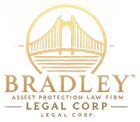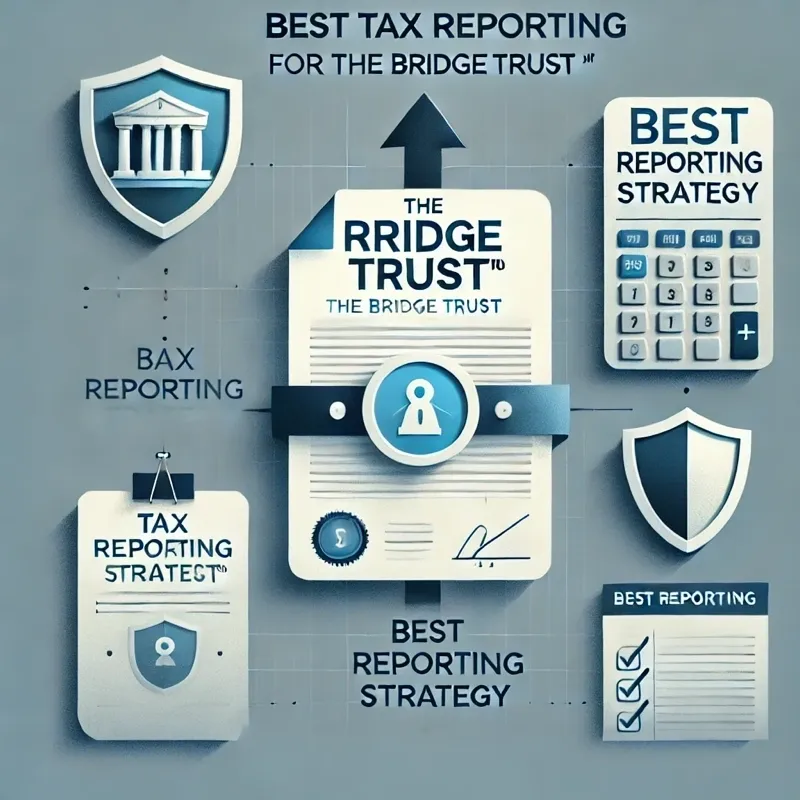Many clients using The Bridge Trust® have questions about its tax reporting requirements. As a grantor trust, The Bridge Trust® is required to file Form 1041, U.S. Income Tax Return for Estates and Trusts, each year. However, the IRS allows for alternative reporting methods that simplify tax compliance while maintaining the asset protection and estate planning benefits of the trust.
This article specifically addresses tax reporting for The Bridge Trust® and should not be considered general advice for all grantor trusts.
Understanding Tax Treatment of The Bridge Trust®
The Bridge Trust® is a grantor trust—meaning, for income tax purposes, the IRS treats the grantor (trust creator) as the owner of the trust. This means:
• All income earned by The Bridge Trust® is taxed directly to the grantor.
• The IRS allows certain reporting methods that can eliminate the need to file Form 1041, as long as the income is properly reported.
• The reporting method chosen must not jeopardize the trust’s asset protection status or cause confusion regarding ownership of trust assets.
IRS Reporting Options for The Bridge Trust®
While Form 1041 is the standard filing requirement for grantor trusts, The Bridge Trust® allows clients to use an alternative method that simplifies compliance. Here’s what you need to know:
1. Standard Filing: Form 1041 (Not Commonly Used for The Bridge Trust®)
• A Form 1041 tax return is filed annually for the trust, showing that it is a grantor trust and passing income through to the grantor’s personal tax return.
• While this method satisfies IRS requirements, it is often unnecessary for The Bridge Trust® because there is a simpler approach available.
2. Alternative Method: Direct Reporting (Preferred for The Bridge Trust®)
This is the method most clients choose for The Bridge Trust®, as it eliminates the need for Form 1041 while keeping the trust in compliance.
How Direct Reporting Works for The Bridge Trust®:
✔ Financial institutions update tax reporting records to reflect the grantor’s name and Social Security number, while keeping the trustee’s address for mailing purposes.
✔ All trust income is reported directly on the grantor’s personal tax return (Form 1040) without the need for a separate trust tax return.
✔ To maintain the legal integrity of The Bridge Trust®, the grantor’s financial documents should list both the grantor and the trust’s name (e.g., “John Doe, grantor of The Bridge Trust®”).
Why Direct Reporting is the Best Tax Strategy for The Bridge Trust®
Most clients using The Bridge Trust® prefer direct reporting because it:
✔ Eliminates the need for Form 1041
✔ Simplifies tax compliance without affecting trust protections
✔ Ensures IRS reporting remains accurate and transparent
✔ Prevents unnecessary administrative burdens
While some trusts require complex tax filings, The Bridge Trust® is specifically designed to allow for direct reporting, making tax season easier for clients.
Important Considerations for The Bridge Trust® Tax Reporting
• Ensure Proper Documentation: To prevent any confusion over ownership, financial records should always include both the grantor’s name and The Bridge Trust® name.
• No QSST Exceptions Apply: Unlike other types of trusts, The Bridge Trust® does not fall under Qualified Subchapter S Trust (QSST) rules, meaning it qualifies for the direct reporting method.
• Grantor Tax Information Letter (Not Required in Most Cases): Typically, a trust must provide a tax information letter to the grantor. However, if the grantor is also the trustee or co-trustee, and the direct reporting method is used, this letter is not necessary.
• Estate Planning & Asset Protection Considerations: Using the direct reporting method does not affect The Bridge Trust®’s legal standing, as long as ownership is properly documented.
Final Thoughts: The Best Tax Reporting Approach for The Bridge Trust®
For clients utilizing The Bridge Trust®, the direct reporting method is the most effective way to remain IRS-compliant while avoiding unnecessary tax filings. At Bradley Legal Corp., we specialize in The Bridge Trust® and its tax and legal structuring, ensuring that clients benefit from asset protection, estate planning advantages, and simplified tax compliance.
If you need guidance on how to properly report income from The Bridge Trust®, we are here to help.
Need Professional Advice? Contact Bradley Legal Corp. Today!
We help high-net-worth individuals and business owners ensure their asset protection strategies remain legally sound and IRS-compliant. (888) 773-9399
By: Brian T. Bradley, Esq.




